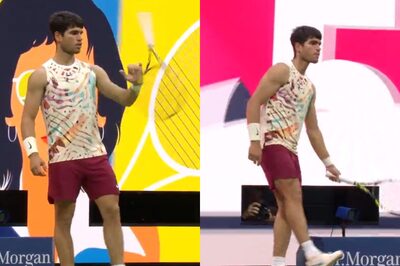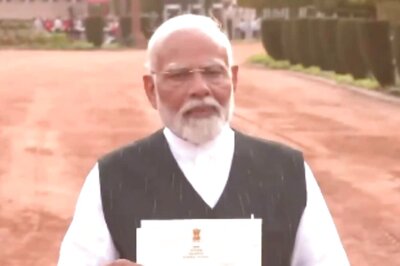
views
Our bodies are a physical manifestation of our intangible selves which engage to bring sports into existence. Sports and our bodies are linked inextricably, be it in terms of a sporting hobby, to maintain physical fitness, or of course as a commercial enterprise that feeds into our capitalist system. The commercialisation of bodies and sports is so obvious; however, we fail to notice how it operates within society on a daily basis.
Yet again, our best friend, the media, plays the lead role in bringing the commercialisation of sports to fruition. The extreme permeability of the media, via channels dedicated to sports as well as the facility of several live and offline streaming platforms, allows a time-space compression to take place. This compression and ease of accessibility to viewing sports connect the audience, performers and profiteers in a triad. For instance, a typical T20 cricket match lasting approximately two and a half hours is compressed into a half an hour ‘highlights’ version, offering a high incentive for those with busy schedules to be able to tune in even for a fraction of the original time. Furthermore, the recent trend of inviting well-distinguished celebrities as hosts, commentators and team representatives, attempts to use this associative influence to appeal to the audience. Hence, by merging the audience pool of Bollywood stars and of cricket, the overall popularity and ‘value’ of the sport increases. It would be apt to insert the example of Virat Kohli and Anushka Sharma here. Those who were solely Bollywood fans are now somewhat more willing to commit themselves to cricket, since “the husband of my favourite Bollywood actress is a cricketer.”
One might think that food has nothing to do with the commercial aspect of sports, apart from the health of the players. Little do we realise, that the agenda behind the freshly installed humongous flat-screen TVs in restaurants and eateries are nothing but an extension of the commercialisation of sports. The cafe culture of sports provides an environment of leisure and entertainment where sports can be viewed with family and friends, with the luxury of delicious food. Using this, restaurants seek to keep their customers around for longer, hence making larger profits during ‘match season’. The entire meaning, then, of what a ‘weekend’ really is, is defined by the broadcast timings of matches, which are scheduled to reach the maximum number of audiences.
Drugs, not very exclusive from the food category, are yet another aspect of the commercialisation of sports. Be it energy-boosting sports drinks or supplements such as Whey protein, or physical performance-enhancing drugs like Creatine or steroids, the commercialisation of sports acts as a legitimacy badge for drug usage, simply because “it is to maximise my sporting output.” The long-term negative effects of artificial external substances far outweigh the short-term advantages, but are nonetheless opted for by thousands of athletes and competitive sports players. We tend to be biased and value only ‘healthy’ bodies that are capable of performing. Social structures have made it such that not only the audience, but athletes too tend to value performance and output so much that they are willing to withstand the long-term negative effects for an instant enhancement in bodily capacities. These very bodies that withstand so much wear and tear are ironically idolised and used as advertisement magnets.
Amidst the ‘hype’ of sports, do we stop to think of how the players themselves are commodities, playing along to the tunes of capitalist frameworks? Surely we have heard of how the arms or legs or other output-producing parts of the bodies of sports people are ‘insured’ as an asset. Were Messi to hurt his foot and pull out of a football match, would that not mean a fraction of the audience would pull out from attending the game, paying money for the tickets and buying merchandise too? Sporting bodies and the sharpened skill sets they wield, unfortunately, have to be ‘sold’ for a career, regardless of the reason that fuels it. Certainly, it is not as terrible as it sounds, because monetary compensations are expended in cases of injuries and inability to perform, but it is temporary. Your sponsors sponsor you because of your performance, but if the consistency of performance falters, the sponsors replace you with a ‘better’ and more profit-producing player.
Another very interesting phenomenon that can be easily observed is the merchandise culture. Notice how every convenience store is rearranged to display jerseys, horns, caps and team flags every time the IPL season hits? By handing out merchandise that acts like little tokens of ‘loyalty’ to one’s team, is it really the sport that is being popularised or the very players who are symbols of “sportsmanship”? Speaking of loyalty, the geopolitics aspect is as inalienable as any of the others. While supporting a team, or a player, we form ‘fandoms’, that function almost as a religion in themselves. Players in all sports are representatives of the region they hail from, be it a village, city, state or nation. Supporting a player from another country is instantly labelled as ‘anti-national’ or ‘unpatriotic’ by others, turning it into an issue not of sports but of politics. Many times, the colonial baggage and hatred that is inscribed into us, manifest in the way we choose to support any other team but that of the colonisers. An even more pressing issue becomes that of the sentiments of the audience of one nation towards foreign players, who are condemned for ‘taking up’ the spot of a native aspirant. All in all, the sports industry is supported by and taken advantage of by a number of peripheral industries that interact with each other to produce a ‘cultivated’ entertainment that we enjoy.
Yashee Jha, a multi-faceted student, is an avid commentator on various topical issues. Views expressed are personal.
Read all the Latest Opinions here



















Comments
0 comment